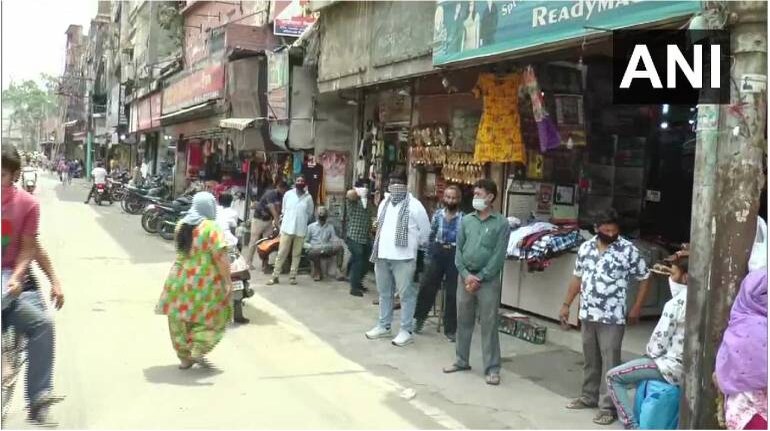



The Punjab government on Tuesday extended curbs to tackle coronavirus for another 10 days as the Union Health Ministry flagged concerns, saying the state was neither conducting enough tests nor promptly isolating positive cases.
According to a statement, Punjab Chief Minister Amarinder Singh ordered to keep schools and colleges shut by another 10 days till April 10 after officials informed him at a meeting that a fall in daily cases is expected only by mid-May with the infection numbers likely to peak around April 6. Meanwhile, Union Health Secretary Rajesh Bhushan told reporters in New Delhi that in Punjab, the average daily infection numbers have shot up to 2,742 from just 332 cases in the second week of February.
Giving an overview of the COVID-19 situation in states and Union Territories, Bhushan said the average daily deaths in Punjab have also risen to 52 from eight in February. "This signifies that neither are you (Punjab) doing adequate number of tests nor are you able to promptly isolate positive people," he said at a press conference.
According to the Union Health Ministry, Punjab has been recording high positivity rate of 8.82 per cent. Earlier in the day, the Punjab government extended restrictions to tackle coronavirus with schools and colleges to remain shut for another 10 days.
Chief Minister Amarinder Singh also ordered to ramp up testing and coronavirus vaccination drive. He directed officials to identify places to set up mobile vaccination centres. The chief minister ordered that all restrictions that are in place till March 31, will now remain in force till April 10, according to a statement.
On March 19, the state government had ordered the closure of educational institutes besides imposing gathering restrictions at cinema halls, malls and social events till the month-end. The state government had ordered that not more than 100 people should be allowed at malls at any time while the cinema halls were told to keep the numbers at 50 per cent of their total capacity.
In the 11 worst-hit districts, a complete ban was ordered on all social gatherings, except for funerals and weddings, in which only 20 people were allowed. The CM on Tuesday directed the Health Department to increase the number of vaccination sites to target the priority categories.
Amarinder Singh also ordered the launch of a vaccination drive in state prisons as 40 women in Patiala's Nabha open jail tested positive for coronavirus. Expressing concern over the situation, Amarinder Singh asked Chief Secretary Vini Mahajan to issue the necessary directions for carrying out testing and vaccination in busy market areas and crowded places.
Adviser (Health and Medical Education) K K Talwar suggested that routine non-COVID treatment in some of the select private hospitals may be deferred by two to three weeks and more ambulances be made available to the district hospitals where there are no medical colleges. The CM directed pooling of resources available in districts with high number of cases for effective management of the pandemic.
The CM was told at the review meeting that positive cases and deaths are rising rapidly in some of the districts and projections presented by the CMC, Ludhiana, showing infection numbers to peak around April 6. The numbers will be decreasing by mid or late May as per the estimates with Jalandhar, Ludhiana, Patiala, Sahibzada Ajit Singh Nagar, Hoshiarpur and Kapurthala expected to contribute more cases.
Positivity rate is likely to be high in those below 40, the officials said citing the projections. There is a need to increase the bed availability in some of the private hospitals treating critically ill patients, the chief minister stressed.
Strict monitoring of patients in home isolation should be done, the CM said, adding that they should be transferred to the appropriate level of healthcare facilities if need be. The CM asked all DCs and civil surgeons to ensure that no death occurs in a Level-2 facility and there is early shifting of a patient to a Level-3 facility once it is established that the patient needs critical care.
On the vaccination front, the CM directed that any photo ID shall be sufficient to approve the vaccination of eligible beneficiaries. A recent survey had shown the UK strain of the virus to be the most prevalent in the state.
While 326 of the 401 coronavirus positive samples sent initially to the NCDC (National Centre for Disease Control) for genome sequencing were found positive for the UK variant, of the 95 samples sent to the IGIB (Institute of Genomics and Integrative Biology, Delhi), 85 samples were found to be positive for the same. On Tuesday, Sixty-five more people succumbed to the infection in the state, taking the fatality count to 6,813, even as 2,210 fresh infections pushed the total number of cases 2,36,790.
Discover the latest Business News, Sensex, and Nifty updates. Obtain Personal Finance insights, tax queries, and expert opinions on Moneycontrol or download the Moneycontrol App to stay updated!
Find the best of Al News in one place, specially curated for you every weekend.
Stay on top of the latest tech trends and biggest startup news.